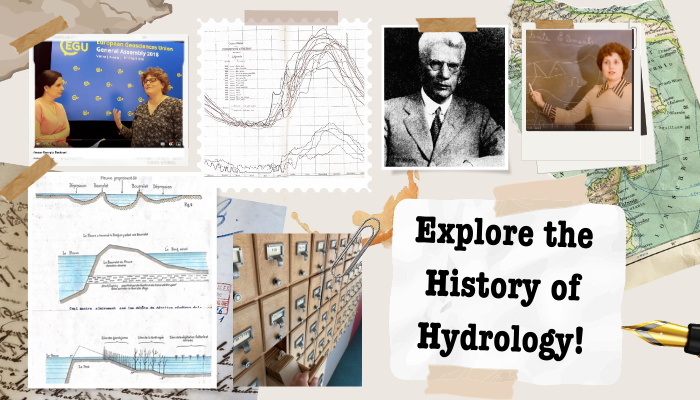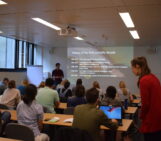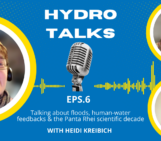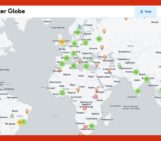
The history of hydrology stretches back millennia: from the engineers of ancient high cultures over scientific pioneers like Da Vinci and Pallisy to modern groundbreaking modellers.
However, so far, few hydrologists have worked to systematically record the history of their discipline – especially in its more recent decades. That is a gap that the History of Hydrology working group of the International Association of Hydrological Sciences (IAHS) seeks to address.
The aim of the working group is to provide a central repository for information on the history of hydrology – on its people, catchments, concepts, and models. It also wants to encourage international contributions from countries whose history of hydrology is currently not well-represented, and to enhance the recording of the contributions of female hydrologists.
Interested? Here’s what you can do to help!
Join the Working Group
First off, if you want to become actively involved, you can join the working group by emailing Prof. Keith Beven (k.beven@lancaster.ac.uk).
That way, you can keep in the loop on everything that is going on – from meetings and sessions at IUGG and EGU to the launch of new goals. Any working group updates will be sent straight to your chosen mailbox.
Contribute to the History of Hydrology Wiki
Another fantastic way of becoming involved in the history of hydrology is by contributing to the Wiki. Launched by Keith Beven, this portal features biographies of seminal hydrologists, histories of research catchments and institutions, as well as hydrological textbooks from all across the world.
Can you think of an important hydrologist you’d like to see represented? Of a university, research institution, or experimental site whose history you’d like to share with the world? Then create an account and write an entry – as a wiki site anyone can register to add information.
Interview Senior Hydrologists
Another initiative by the History of Hydrology working group is to conduct a series of interviews with influential senior hydrologists and upload them to the History of Hydrology YouTube channel.
Many of the hydrologists who conducted groundbreaking research in the 1960s, 70s, and 80s have already passed away. This makes conserving the views, memories, and experiences of those who can still tell their stories all the more important.
Can you think of an important name that is missing and who could still be interviewed? Then reach out and help preserve a visual record of all these amazing hydrologists have to share.
Support the Robert Elmer Horton Archive Crowdfunding Initiative
Finally, you can support the History of Hydrology working group by donating to a crowdfunding initiative that allows members to carry out research and preserve important records for posterity.
One current key initiative is the Robert Elmer Horton Archive. Horton (1875-1945) was the pre-eminent hydrologist of the English-speaking world in the first half of the 20th Century. He was a founding member and first vice-President of the Hydrological Section of the American Geophysical Union (AGU). When he died, his papers were organised by Walter Langbein into 94 boxes and placed in the US National Archives. As far as we know, these have only been accessed three times: about 20 years ago by Keith Beven who examined 10 of the boxes; by Jim Smith of Princeton who accessed some more in preparing for his AMS Horton Lecture; and most recently by Solomon Vimal, currently at Cornell Tech.

The only known image of Robert E. Horton. Image from Bernard, M., 1945. Robert E. Horton. Bull. Am. Meteorol. Soc, 26, p.242.
Now, Solomon Vimal is on a mission to digitize the contents of these boxes and make them available to the wider hydrological community through an online archive. Already, he has discovered many previously unknown articles and manuscripts by Horton.
In order for the initiative to succeed, though, and for the archive to become available, it needs funding for staff time, and hosting the archive online. If you feel this is a worthwhile project, then please donate (any amount large or small) at the gofundme site: https://tinyurl.com/roberthorton
Conclusion
Exploring and recording the History of Hydrology is a fascinating endeavour. If you’re interested in helping out and contributing your time, resources, or energy, please feel free to reach out! The working group is welcoming and always thrilled to welcome new, enthusiastic members.
Edited by Christina Orieschnig




